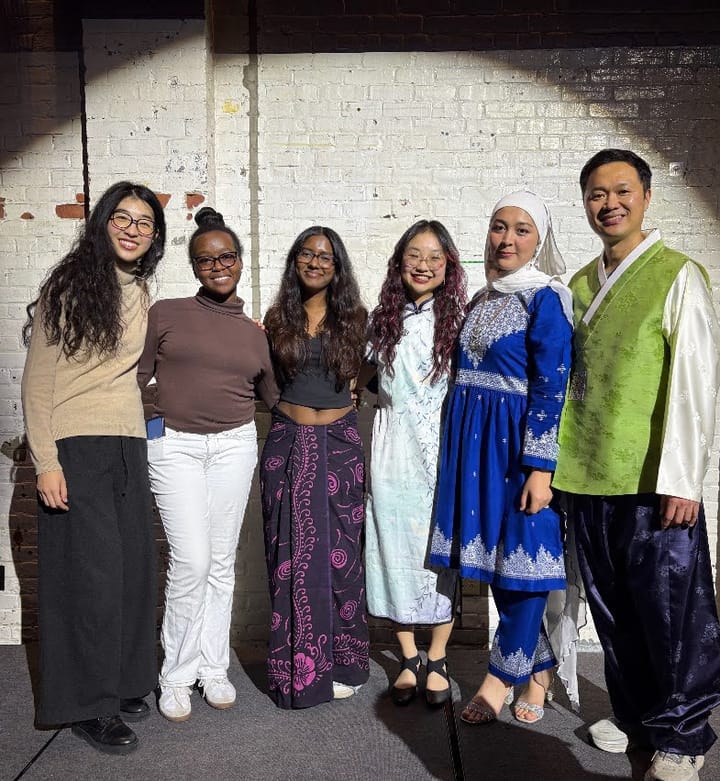Asking BIPOC Creatives: Madina Oraz ’25
In this second installment of Asking BIPOC Creatives (ABC), Managing Arts & Living Editor Mackenzie Dunson ’25 interviews Madina Oraz ’25 about their involvement in theater and queer spaces across campus.
Madina Oraz ’25 embodies what it means to experiment with art. On top of majoring in both mathematics and law, jurisprudence, and social thought (LJST), they are also very involved on the Amherst campus, serving as co-executive chair of the QTPOC (Queer & Trans People of Color) group, as well as treasurer and producer for the Green Room, a student theater group. Oraz also holds multiple campus jobs as a Center Organizer of the Queer Resource Center, a Peer Research Assistant in Frost Library, and as the Community Advisor (CA) for Marsh House.
I was initially drawn to Oraz’s work as director of the Green Room play “Amherst Psycho,” a parody of the cult classic film “American Psycho.” The play deals heavily in the absurd, which, I later discovered, is a theme that Oraz likes to interact with throughout their work. In order to draw out this absurdity, Oraz explained, they engaged in a very collective artistic process while discovering and writing the play.
It began modestly, as an idea to parody the original film, but one that stuck and unfolded enthusiastically. “Because you have that idea in mind, you just keep developing it and you talk to your friends and people keep saying stuff to you and you keep that idea with you,” Oraz said. They expressed that their friends were their main supporters, and launchpads they could bounce ideas off of. They added, “Some of the ideas that came in my head were also through the encouragement of my peers, and the fact that me and my friends have an environment where we can just like discuss the most absurd ideas that we don’t even plan to come to fruition.”
Oraz was already a part of Green Room, but felt compelled to take on a larger role because of “some sort of FLI FOMO [first generation/low-income fear of missing out].”As amusing as this conclusion is, it is a very real and pervasive experience for the FLI community on campus, in my experience?
For Oraz, directing “Amherst Psycho” was “a testament to [their] leadership abilities and creative skills.”
“I felt like I didn’t contribute a lot to things,” Oraz said. “I’ve been treasurer to the Green Room for a while, but I wanted to leave my mark.”
Even carrying this pressure, Oraz exudes a certain casualness that makes way for the playfulness of their craft, which they attributed to the support of their community.
“While [directing Amherst Psycho] was stressful at times, I don’t think at any point I felt immense dread over it because I have such a great team and I had great support … While it’s such a big show, and I’m glad it turned out to get so big, in my head it’s just a silly parody,” Oraz said, adding that the fact they were able to have fun amid the hard work was “what kept me really sane.”
Oraz approaches all their art with the objectives of exploration and discovery. They said that the artistic process was “a learning curve” for them, and they had to overcome a fear of failure that many pursuing artistic endeavors often feel. Instead of backing away from ideas that may be intimidating or confusing, Oraz dives headfirst into them. They continue to credit their communities on campus, specifically the queer and POC spaces on campus, where they receive positive feedback on their work, and feel free to fail and experiment.
Being a non-binary person from Kazakhstan, Oraz is always conscious of power dynamics in America: “[To] exclude queerness, transness, and racial identity from [my] art is almost impossible,” they said. “It just sounds miserable.” Their identities motivate them to create, to tell stories in ways they want to present them.
For a long time, Oraz didn’t consider themselves to be a particularly artistic person, because the traditional European pieces they were exposed to promoted a very white, Eurocentric perception of art. “I kind of don’t care [about that art], not because it’s bad, but because it doesn’t speak to me and I think that’s what distanced me from art more and more,” Oraz said. However, as they met people with perspectives that diverged from this, they felt more comfortable interacting with queer art that subverts traditional norms.
I wrapped up my conversation with Oraz by asking them about some of their smaller-scale projects. They began by telling me about a classic Kazakh children’s book they read when they were younger, “My Name is Koja” by Berdibek Sokpakbaev, which is about a little boy who wasn’t the best at things but makes a pledge to become better.
Oraz internalized the ideas of the book, and it inspired them to make pledges to themselves as well. For example, Oraz started writing every day — not necessarily long stories, they said, “but if I start a thought, I try to finish it.” This process also has helped them become more accepting of their art. They also write poetry, and told me about working through the feeling that poetry is “cringe.”
They told me they focus on their belief that “it’s great to think about things not in terms of how they will be received, but the way they influence you. And I think the way my writing helps me feel, it's a visual representation of how powerful my mind is.”
This process of writing for Oraz is a confirmation of their creative abilities.The artistic process is a reaffirmation of their skills, and an advancement past the fears of failure.
It’s refreshing to see someone approach art for the sake of exploration, rather than for the sake of production, which is a concept that Oraz exemplifies. Oraz is a community-based creator, turning to their peers for inspiration and critique, and a reminder that art expands past the Eurocentric views that often dominate the arts. By incorporating art into their lifestyle, they work past their fear of failure, and create pieces that push the boundaries of what they can do.





Comments ()